Reporter: What are you doing?
Interviewee: I’m cutting carrots and cucumbers.
Reporter: What shapes are you cutting them into?
Interviewee: Stars, hearts, and flowers. This is a pretty carrot flower, isn't it?
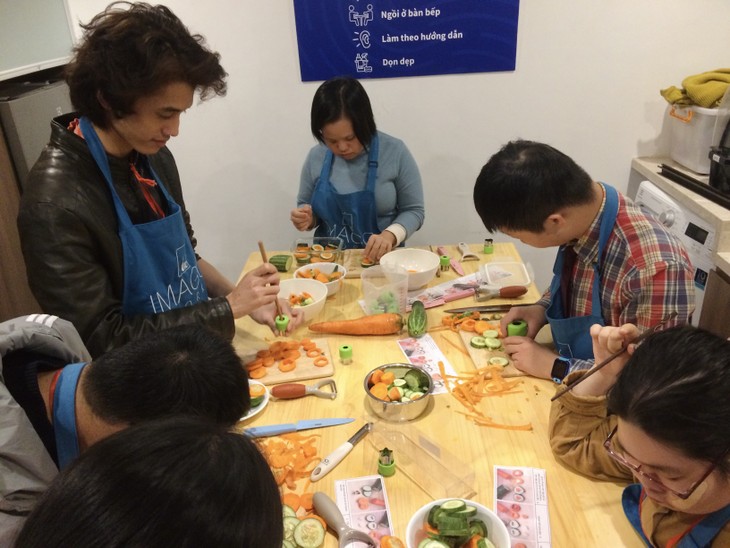 Imago Work students practice cutting vegetables (Photo: VOV) Imago Work students practice cutting vegetables (Photo: VOV) |
Imago Work’s founder, whom the students call “Auntie Michelle”, has four children. One of them, Evan, was born with Down syndrome in 1996. He was brought up the same way as his siblings, and later on went to Shepherds College for students with intellectual disabilities. After graduation, Evan returned to Vietnam to work at his parents’ coffee shop. He said: "I do some dishes, make coffee, make new drinks, and I serve."
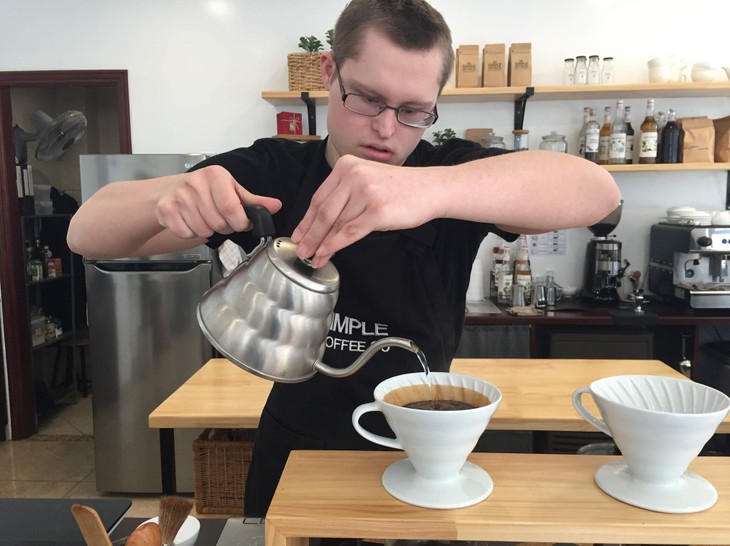 Evan works at Simple Coffee (Photo: Michelle Beard) Evan works at Simple Coffee (Photo: Michelle Beard) |
What Evan can do got Michelle wondering if there are other workplaces that provide jobs for disabled people like her son. "We’d like to see more people like Evan be able to go to work," she said, "There actually are a lot of jobs that young people like them can do. They just need an opportunity and some training that’s really focused on them. And they also need businesses and employers who are willing to be understanding and open to including them in the workplace. Even though in the beginning it takes a little more time to train them, the result is very positive."
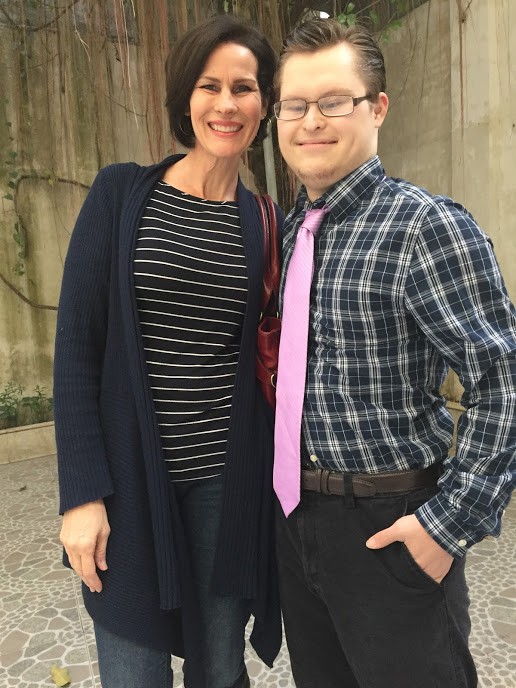 Evan (R) and his mom Michelle (Photo: Michelle Beard) Evan (R) and his mom Michelle (Photo: Michelle Beard) |
Michelle knew Jason Weimer, founder of a cafe called Simple Coffee that provides jobs for disabled people in Thailand. In 2018, she joined other stakeholders to open a branch of Simple Coffee in Hanoi, with the same philosophy of empowering people with disabilities to live and work independently. From there, the Imago Work project was born. Its training program provides students with physical, emotional, and life skills, in addition to vocational development. They are taught self-care skills, communication skills, and safety skills, and also learn how to clean counters, wash cups, pack coffee bags, prepare drinks, and serve customers.
Michelle explains the main methods she and her team use to train them: “First, we break down the steps in details so that it’s easier for them to achieve. We put each step with a visual that has simple instruction. The second thing that is also very important is to build their independence so that they don’t become dependent on the teacher or employer always telling them what to do. We train them to look at their list, check off things after they do it and see what they need to do on their own.”
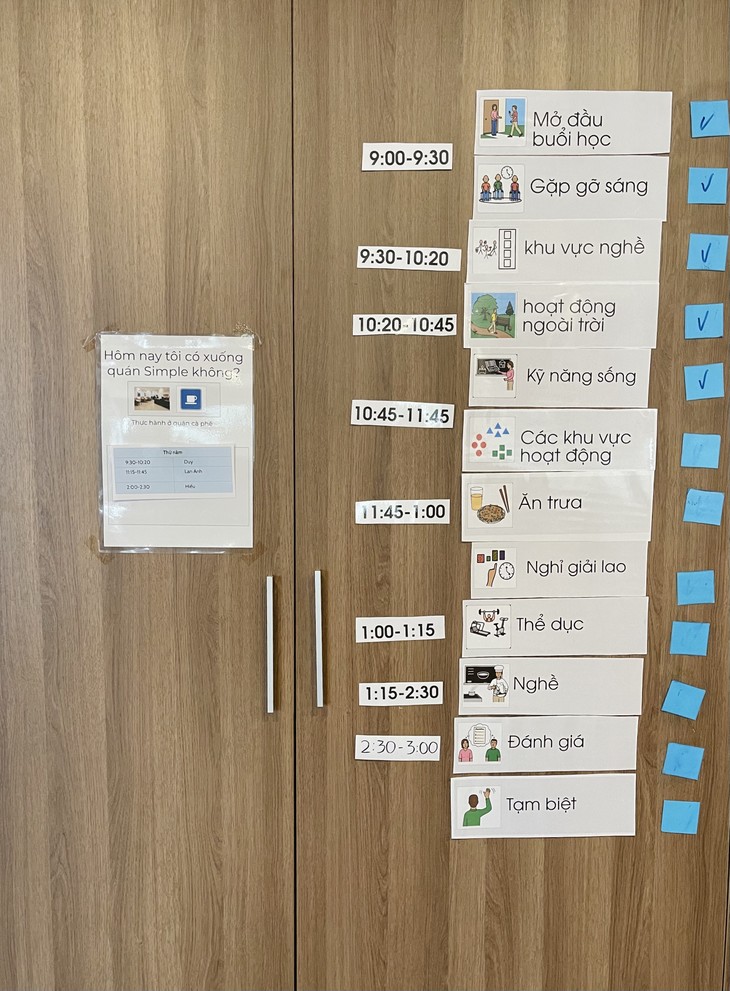 A timetable for Imago Work students, which includes vocational training and activities to practice life skills (Photo: VOV) A timetable for Imago Work students, which includes vocational training and activities to practice life skills (Photo: VOV) |
The training journey has not been all roses and butterflies. Coach Le Thi Bich Van, who has been working with the students for almost a year, said the most challenging part is helping them control their emotions. She recalled an achievement with a student that is unforgettable to her: "When he first came to us, he was having a hard time identifying his emotions and what to do with it. When he got mad, he would just shut down and wouldn’t respond to anything. We figured he really needed some skills to know how to cope with his emotions. We slowly helped him learn that emotions are ok, everybody is frustrated at times, so he doesn’t feel like he’s different from everyone else. Now, he can speak for himself, for example: 'Teacher, I’m frustrated. Can I take a break and go to a quiet place for 2 minutes?' To me, that is a huge success. And I’m very proud of it."
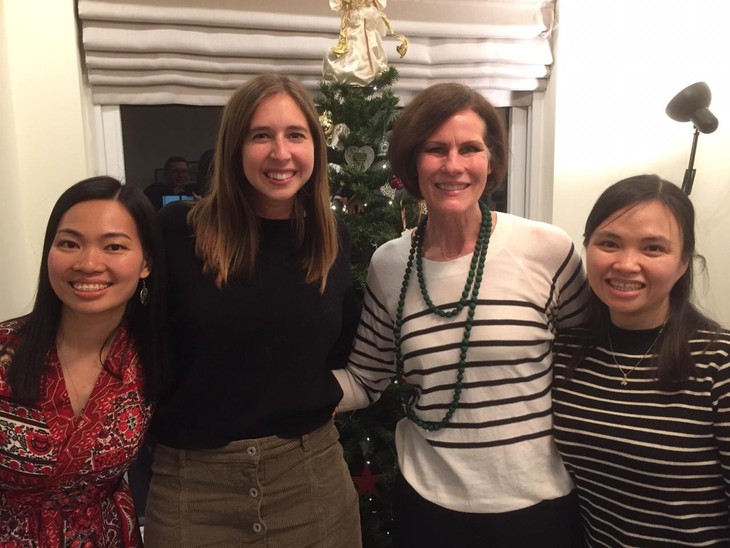 Coach Bich Van (far left) and her co-workers at Imago Work project (Photo: Imago Work) Coach Bich Van (far left) and her co-workers at Imago Work project (Photo: Imago Work) |
Since mid-2020, Imago Work has only operated a summer course for 3 months and an ongoing full course, but Michelle has seen progress in the students themselves and in the community. "We go out into the community quite a bit," she said, "We walk to other workplaces, we do tours, and we regularly visit a park nearby. And in the beginning, it was interesting to see the community members around looking at our students. It was a bit uncomfortable for us. After our teachers talked to them and explained to them what Imago Work is, who our students are, we can see a change in the way people are interacting with our students. Now, instead of staring at them or going away from them, they smile and say hi, and they are friendly and more accepting with them."
Imago Work’s students are not the only beneficiaries of the project. Coach Bich Van said she is not only teaching but also learning and discovering her own potentials day by day, and that she’s happy to be on this journey with her students. "It feels so special because we have a very unique relationship with them," she said, "And just the thought of being able to help them build a better future is really something that drives me forward and makes me want to be better every day."
 Imago Work students practice folding towels at Intercontinental Hanoi hotel (Photo: Imago Work) Imago Work students practice folding towels at Intercontinental Hanoi hotel (Photo: Imago Work) |
Aside from learning and practicing skills in the classroom, Imago Work’s students and teachers have also visited some of its partner businesses that share the goal of providing jobs for people with disabilities, such as the Intercontinental Hanoi hotel, KOTO, and Joma Bakery. Imago Work is looking for more partners to create job opportunities for students after graduation, so it can continue the success it’s had so far.